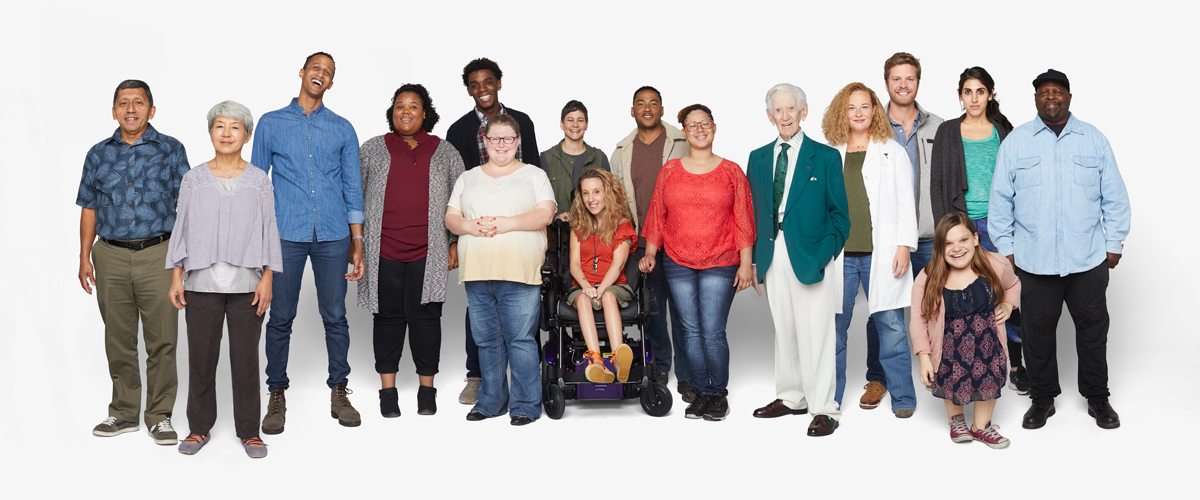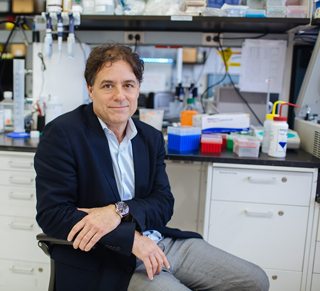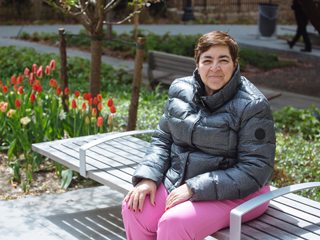Representing All of Us in Research
To address gender, racial, and age gaps in medical research, All of Us is gathering health information from 1 million people to speed up medical breakthroughs and advance precision medicine.

Image courtesy of the National Institutes of Health
Evelyn Ortiz, 61, says she has always been “big on volunteering” but has never taken on a mission as big as All of Us, a nationwide effort to enlist 1 million people to participate in research gathering DNA and other health information for a massive database to advance precision medicine.
To recruit participants, Evelyn rides around on her motorized scooter, passing out flyers in her church. She also accompanies friends and neighbors to NewYork-Presbyterian/Columbia University Irving Medical Center to enroll in the groundbreaking research effort. She hopes to educate community members about the goal of All of Us, namely to create the largest, most diverse database in the U.S. so that researchers can develop more individualized treatments, known as precision medicine, for cancer, heart disease, and other medical conditions.
“It isn’t easy,” she says of persuading people to take the time to travel to the hospital to fill out a questionnaire about their lifestyle and personal and family medical history, provide urine and blood samples, and grant access to their electronic medical records. Height, weight, and blood pressure also might be measured.
“I’m trying to convince people, ‘It’s not going to do you any harm and it may do you some good,’” she says. “I tell them [precision medicine] is the medicine of the future, but you need people to volunteer in order to do the research. How did we get this far in medicine? By research, right?”
Engaging an Underserved Community
May 2019 marked the one-year anniversary of the national launch of the All of Us Research Program, which has enrolled over 230,000 people across the country as of July 2019. All of Us is a nationwide initiative of the National Institutes of Health (NIH), and is being led in New York City by a consortium comprised of four collaborating institutions: Columbia University Irving Medical Center, Weill Cornell Medicine, NYC Health + Hospitals/Harlem, and NewYork-Presbyterian. The New York City Consortium has fully enrolled over 17,500 participants through July 2019, with plans to sign up 93,000 people over five years. To reach this goal, the Consortium has engaged in a wide range of outreach activities at clinics and hospitals, street fairs, and community group events as well as a citywide advertising campaign.
True to one of the program’s core missions, 80 percent of All of Us participants are from communities that are traditionally underrepresented in biomedical research, including Hispanics, African Americans, and Asians.
All of Us is designed to accelerate and broaden the use of precision medicine, which takes an individualized rather than a “one size fits all” approach to healthcare. It is an emerging approach to disease treatment, prevention, and care that considers differences in people’s lifestyles, environments, and biological makeup, including genes. But to make it work on a large scale, a massive trove of genetic and other health information is needed.

David Goldstein, the lead principal investigator for the All of Us New York City Consortium
“I think we are undergoing a transformation in care where, increasingly, the interventions we offer will be provided in a way that’s predicated on the cause of disease in each individual patient,” says Dr. David Goldstein, the lead principal investigator for the All of Us New York City Consortium and the director of the Institute for Genomic Medicine at Columbia University Vagelos College of Physician and Surgeons.
“It’s already the case that, in a lot of therapeutic areas, looking at the genomic data can have direct implications for how patients are managed,” says Dr. Goldstein, whose institute researches precision medicine for conditions such as epilepsy, kidney disease, liver disease, and pregnancy complications. “We (genetically) sequence patients who have, for example, unexplained epilepsy, and identifying the genetic cause will often tell you what medicines are likely to work and likely not to work. They might give you guidance about the order in which to try medicine.”
Since 2015, the U.S. Congress has allocated $1.02 billion to All of Us, and more than 340 recruitment sites have been established throughout the United States. The data will create one of the world’s largest and most demographically diverse biobanks of detailed health and genetic information. The data will be stored by Vanderbilt University Medical Center in Nashville, Tennessee, with the biosamples securely stored at Mayo Clinic in Rochester, Minnesota. Researchers across the country will be able to tap this vast library of information to study a spectrum of health conditions and develop treatments that target lifestyle and genetic drivers of disease. It is expected to support thousands of studies across a wide range of health topics.
Program participants will have access to their own health information, summary data about the participating community, and information about studies and findings that come from All of Us.
The All of Us Research Program will be an engine that accelerates healthcare research and medical breakthroughs, and will generate paradigm shifts in our understanding of healthcare delivery across our communities.
Dr. M. Elizabeth Ross
Building a Diverse Database
For the research data to be meaningful, it must reflect a broad range of the country’s population, both healthy and those with disease. All of Us’ extra efforts to enroll participants from groups it refers to as underrepresented in biomedical research, meaning people in minority and lower-socioeconomic communities, is important because diseases present differently among ethnic groups — sometimes at an earlier age or progressing more rapidly or responding differently to a particular medical regimen. Understanding what causes this is a key element of the program.
“Creating a large and diverse database is one of the major driving forces behind All of Us,” says Dr. Rainu Kaushal, chair of the Department of Healthcare Policy and Research at Weill Cornell Medicine and co-principal investigator of the Weill Cornell arm of the New York City Consortium. “There are important factors among different demographics that need to be taken into account in the treatment of common disorders like diabetes and hypertension or in the prevention of Alzheimer’s.
“We also want to be able to use the information that is collected to address inequities and inadequacies in the way that healthcare is delivered,” adds Dr. Kaushal, who is physician-in-chief of healthcare policy and research at NewYork-Presbyterian/Weill Cornell Medical Center. “By following volunteers over time, we gain knowledge of what works and what doesn’t work to treat and keep people healthy.”

Evelyn Ortiz, an All of Us participant advisory board member
An Engine to Accelerate Research
Diagnosed with cerebral palsy as a baby, Evelyn underwent a dozen surgeries at NewYork-Presbyterian/Columbia University Irving Medical Center, where she was born, to correct the direction of her ankle and leg bones to enable her to walk. In late 2017, Evelyn was at the hospital for an X-ray when she spotted an information table promoting All of Us, which inspired and motivated her to get involved. Evelyn says she is grateful for the medical care she received at the hospital and sees her work with the program as a way of giving back — beyond the volunteer work she has done there in the past. Today, she says she is determined to aid in the program’s goal to amass data to help expand the use of precision medicine.
“I think if we can accomplish that, that would be amazing,” she says, citing among those wishes the possibility of making better medicines and treatments for cerebral palsy. “And you know how many other things we could prevent through this?”
The question most often asked by people before they sign up for All of Us is, how secure is the health and genetic information? There are multiple levels of controls for maintaining privacy. Participants’ names and other identifying information will be removed from their data and replaced by a code before it is stored. A master list linking the codes to names will be kept separate and secure. Researchers can apply to gain access to the data. But to learn the participants’ identities, by accessing their electronic medical records, for example, will require additional, rigorous approvals.
“The All of Us Research Program will be an engine that accelerates healthcare research and medical breakthroughs, and will generate paradigm shifts in our understanding of healthcare delivery across our communities, large and small,” says Dr. M. Elizabeth Ross, the Nathan Cummings Professor in Neurology and the director of the Center for Neurogenetics in the Feil Family Brain & Mind Research Institute at Weill Cornell Medicine and co-principal investigator of the All of Us New York Consortium. “It will enable us to individualize healthcare one person at a time. NewYork-Presbyterian is dedicated to contributing to this next revolution in biomedical research. This is going to change the capabilities for healthcare delivery in the 21st century.”
People interested in participating in the All of Us Research Program can do so at several locations across New York City. To contact a site directly, please see the following:
- Columbia University Irving Medical Center, 212-305-9927, allofus@cumc.colubmia.edu
- NYC Health + Hospitals/Harlem, 212-939-4204, allofus-harlem@nychhc.org
- Weill Cornell Medicine, 646-962-6170, allofus@med.cornell.edu
- NewYork-Presbyterian Brooklyn Methodist Hospital, 646-962-6170, allofus@med.cornell.edu
You can also enroll here or call 833-AOU-JOIN (833-268-5646), select your preferred enrollment location, and All of Us staff will help you begin the sign-up process. To learn more, visit joinallofus.org/NYC.
